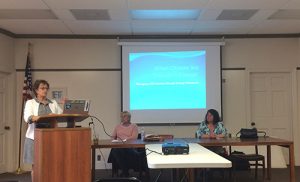
SNOW HILL – While eager to see more regulation of large scale poultry operations, speakers at a meeting hosted by Assateague Coastal Trust say the bill being considered by Worcester County officials doesn’t go far enough.
On Tuesday, Assateague Coastal Trust (ACT) hosted an informational meeting regarding the bill being considered by the Worcester County Commissioners next week that would amend zoning regulations for poultry operations. Coastkeeper Kathy Phillips, executive director of ACT, said the proposed changes didn’t do enough to address the density of large poultry operations as well as air emissions and wouldn’t prevent someone with adjacent parcels from turning both into Confined Animal Feeding Operations (CAFOs).
“I think if Worcester County’s going to do it they should do it right,” Phillips said. “This is their opportunity.”
As proposed, the bill being considered would create a new section of the zoning code to address poultry operations. It would define poultry operations, increase setback and buffering requirements and limit the number of chicken houses allowed on a parcel to eight.
Phillips said that while the limit sounded like a good thing, there was no language in the proposed changes to prevent someone with adjacent parcels from erecting eight chicken houses on each. Phillips said the setback in the new requirements was 200 feet. While she considers that an improvement over the county’s current requirements, Phillips says it’s still not a huge distance. It also doesn’t prevent several CAFOs from popping up in the same neighborhood. She said the proposed poultry regulations didn’t require officials to consider how many large poultry operations were in a particular area.
“How densely are we paving over the county with large industry, gobbling up good farmland to basically put up something that’s the size of a Super Walmart and its parking lot?” she said. “Once these houses have been used for a number of years you can never put that land into crop production again.”
Phillips also voiced concern regarding the large tunnel ventilation fans used by CAFOs.
“Do you want to have all those fans blowing over to the adjacent property owner?” she said. “That’s something that’s missing.”
Phillips said the proposed changes would not affect existing poultry operations.
“There’s quite a bit of grandfathering in these regulations which is troubling,” she said, adding that existing operations would be able to be improved without meeting the new regulations.
Phillips said a health ordinance to address poultry operations would go further in protecting the county.
“A health ordinance takes you beyond the border of the parcel and begins to require a more holistic view of the entire area,” she said.
Phillips said such an ordinance would address the cumulative impacts of CAFOs, such as their effect on air quality, and could do things like require filters on fans.
Carole Morison, a Pocomoke farmer, says that while she has a flock of pasture-raised hens now, she spent years raising chickens for Perdue. In her opinion the modern day CAFOs are nothing like the chicken farms of the past. In decades past, she said a farm would have had a few poultry houses and fields of crops.
“It was a diversified farm,” Morison said. “What we’re seeing now is not a farm. It’s industrial production.”
Her concern is that county officials aren’t doing enough to protect existing homes and businesses as CAFOs go up. She added that Worcester County’s rural roads, already narrow, couldn’t withstand the heavy truck traffic that was associated with large poultry operations.
“Who’s going to pay to repair the road?” she said. “It’s going to be the citizens. There are so many issues the commissioners have not even looked at.”
Maria Payan, a consultant for the Socially Responsible Agriculture Project, said a poultry operation with eight houses would bring more than 600 trucks a year to the property. She said she’d visited the home of a Somerset County resident whose property was essentially surrounded by poultry operations. In that area there are 108 chicken houses within three miles.
“You can’t stand in his yard without hearing the industrialized fans consistently,” she said. “You cannot stand in the yard without being nauseous.”
Payan said that throughout the country, areas with zoning that permitted agricultural and residential uses were now full of conflict.
“Fifty years ago, ag residential districts were fantastic,” she said. “Nobody had a problem living next to a farm. Now because of the changes in the amount of birds per house and the number of houses per farm we’re running into a lot of conflicts. Communities throughout areas where this is happening, they’re becoming war zones.”
Phillips encouraged concerned citizens to share their comments regarding the proposed poultry regulations with the Worcester County Commissioners. The commissioners will host a public hearing on the proposed bill Tuesday at 11 a.m.

